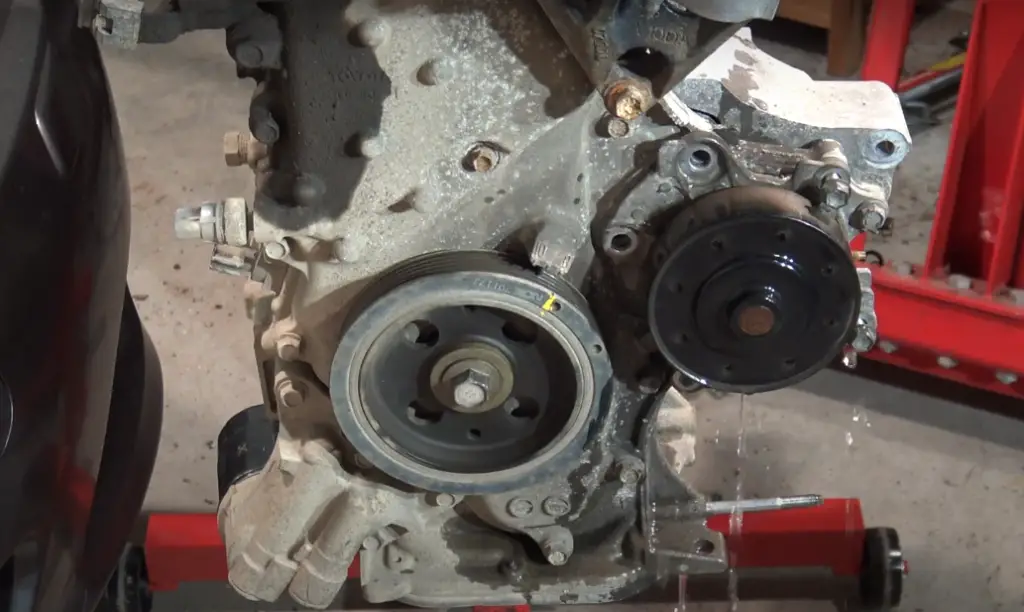Yes, a water pump can cause a coolant leak. The pump’s seals and gaskets can wear out over time, leading to leaks. Corrosion or damage to the pump housing can also create leaks, as well as coolant escaping from the weep hole if internal seals fail. It’s important to address these issues promptly to avoid engine overheating and further damage.
A coolant leak is a common yet potentially serious issue in vehicles, leading to engine overheating and possible damage if not addressed promptly. One of the culprits behind a coolant leak is the water pump, a vital component in the engine’s cooling system. In this blog post, we’ll delve into whether a water pump can cause a coolant leak, the reasons behind it, the signs to watch for, and how to address and prevent this issue.
Contents
The Role of the Water Pump in the Cooling System
The water pump plays a critical role in maintaining the engine’s temperature by circulating coolant through the engine block, hoses, and radiator. This circulation absorbs heat from the engine and dissipates it through the radiator, keeping the engine within its optimal operating temperature range.
Key Functions of the Water Pump:
- Coolant Circulation: The pump ensures that coolant flows continuously through the engine and radiator, preventing overheating.
- Pressure Maintenance: It helps maintain the pressure needed for effective coolant flow, which is crucial for heat dissipation.
- Thermal Regulation: By facilitating consistent coolant movement, the water pump aids in regulating the engine’s temperature under various operating conditions.
Given its importance, any malfunction in the water pump can significantly disrupt the cooling system, potentially leading to leaks and overheating.
Can a Water Pump Cause a Coolant Leak?
Yes, a faulty water pump can cause a coolant leak. The water pump is connected to various parts of the cooling system via hoses and gaskets. If any part of the pump fails, it can lead to coolant escaping from these connections or from the pump itself.
How Does a Water Pump Cause Coolant Leaks?
- Worn or Damaged Seals and Gaskets:
- The water pump is sealed to the engine block using gaskets, which prevent coolant from leaking out. Over time, these gaskets can wear out, crack, or shrink, leading to leaks.
- Additionally, the water pump has a shaft seal that prevents coolant from leaking around the pump’s rotating shaft. If this seal wears out, coolant can leak from the water pump housing.
- Corrosion and Erosion:
- The constant flow of coolant through the pump can lead to corrosion or erosion of the pump’s metal surfaces. This is especially true if the coolant is old, contaminated, or if incorrect coolant is used.
- Corrosion can create small holes or cracks in the pump housing, leading to leaks.
- Coolant Leaking from the Weep Hole:
- Most water pumps have a weep hole, a small opening designed to allow coolant to escape if the internal seals fail. A steady drip or visible coolant near this hole often indicates that the pump’s seals are compromised.
- Cracked or Broken Water Pump Housing:
- In rare cases, the water pump housing itself may crack due to extreme pressure, physical damage, or manufacturing defects, leading to coolant leaks.
- Loose or Damaged Hoses:
- The water pump connects to the cooling system via hoses that carry coolant in and out of the engine. If these hoses become loose or damaged, they can leak at the connection points.

Conclusion
A water pump can indeed cause a coolant leak, which, if left unchecked, can lead to engine overheating and severe damage. Understanding the causes, signs, and prevention methods for water pump-related coolant leaks can help you maintain your vehicle’s cooling system and prevent costly repairs.